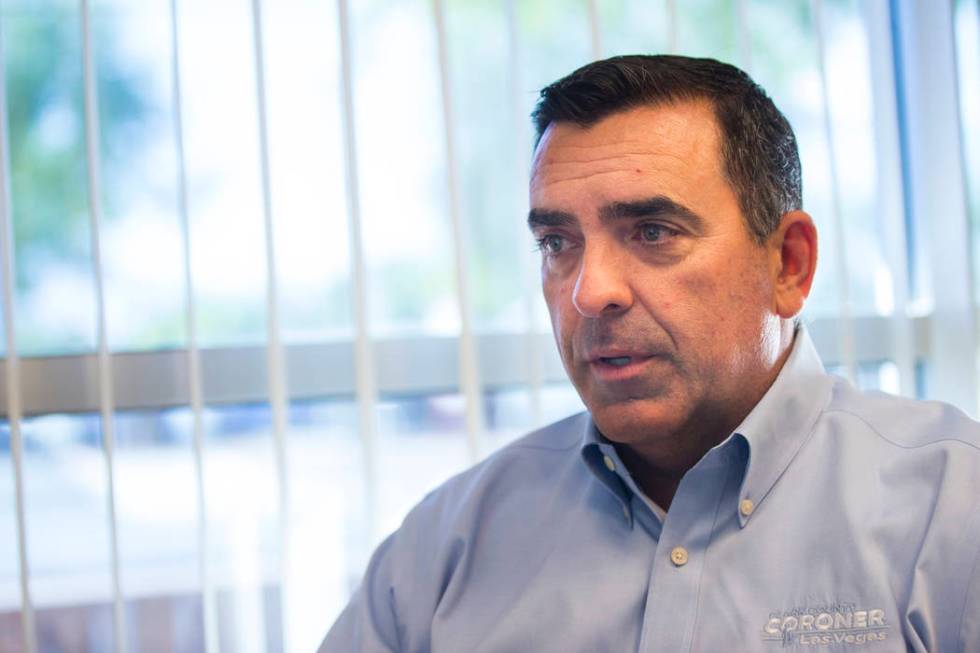Clark County coroner continues to fight release of autopsy reports

A year and a half after the Las Vegas Review-Journal won a court ruling stating that autopsy reports are public records, the Clark County coroner continues to refuse to make the documents available to media and the public.
The Review-Journal had requested autopsy reports to determine whether children had suffered abuse prior to their deaths and whether county Child Protective Services could have prevented the abuse. Coroner John Fudenberg has maintained that autopsy reports are confidential, citing a 37-year-old Nevada attorney general’s opinion.
He also argued that many of the child autopsies the Review-Journal requested were reviewed by the Clark County Child Death Review Team, which the county claims makes them exempt from disclosure.
But Clark County District Judge Jim Crockett slapped down those arguments in September 2017, saying there is nothing in state law that exempts autopsy reports from the Nevada Public Records Act.
“I found the legal arguments insufficient to justify withholding the information,” he said.
The Review-Journal is highlighting the autopsy records case during Sunshine Week, an annual observance of the public’s right to access the government documents and data that keep taxpayer-funded agencies accountable to the people they serve.
Systemic noncompliance
Review-Journal Executive Editor Glenn Cook said noncompliance with the public records law is systemic across Nevada, and that many states make autopsy records public because the documents support the criminal and civil justice systems.
“Coroner’s records are central to law enforcement investigations and prosecutions,” he said. “They ensure accountability for police and numerous other government agencies. They can reveal public health and public safety crises and shine a light on the severity of drug abuse in our community. They are critical to wrongful death lawsuits and insurance claims. Autopsy reports are public records in many states because access to them serves the public interest.”
The county has appealed Crockett’s ruling and the Nevada Supreme Court has yet to weigh in on the matter.
Review-Journal attorney Maggie McLetchie said long delays in settling records requests can undermine the newsworthiness of the records.
“Unfortunately, under current law, government entities have every incentive to appeal and get a stay,” she said. “Appeals and litigation can be expensive and take years.”
Costly for taxpayers
After the county lost in court, Crockett ordered the government to pay the Review-Journal $32,000 to cover the news organization’s legal bills. Through January, the coroner has spent nearly $50,000 in taxpayer money on outside counsel to fight the records request, records show.
The county also continues to deny requests for autopsy records, even for cases that are not part of the child death review process.
In May, the coroner’s office refused to release autopsy reports for the victims of a helicopter crash at the Grand Canyon earlier in the year. County spokesman Dan Kulin told the Review-Journal that the records are available only to next of kin and not the public.
The coroner released the autopsies of the 58 victims of the Oct. 1, 2017, mass shooting on the Las Vegas Strip after a judge ordered him to make the records public. However, victims’ names were redacted on the reports. The coroner also released the autopsy of the killer.
In the Oct. 1 shooting records case, the court ordered the county to pay another nearly $32,000 for the Review-Journal’s legal fees.
The county has paid outside counsel nearly $21,000 through January to fight the fee ruling, records show.
“The county is spending tens of thousands of dollars of the public’s money to keep the public in the dark,” Cook said. “It’s indicative of a culture throughout Nevada government that public agencies are above the law.”
Fudenberg and the district attorney’s office, which is representing the coroner, declined comment through Kulin for this story.
“The county’s legal position is set forth in the briefs filed with the courts,” Kulin wrote in an email.
Contact Arthur Kane at akane@reviewjournal.com. Follow @ArthurMKane on Twitter.